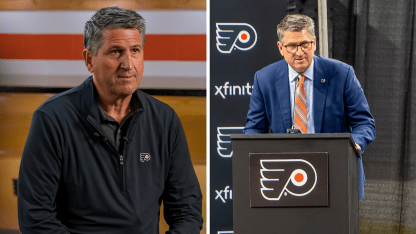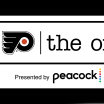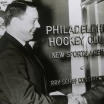At some point in their lives, all NHL players must hang up their skates and start figuring out what's next. It can be a difficult transition for people who spent their whole lives getting to the NHL, and then put their full concentration on staying there. Then suddenly, one day it's over, and the daily routine of going places and doing things when scheduled to do so is gone.
New Career, New Goals
Keith Jones declares "The Philadelphia Flyers are coming back"

By
Brian Smith
philadelphiaflyers.com
When Keith Jones met this point of his life in early 2001, he didn't have to spend much time figuring out what that next step would be. He almost immediately found his way on television at ESPN and what was then Comcast SportsNet, while also hanging around at WIP. He turned both activities into a second career that lasted 22 years.
Keith Jones speaks to media
On Friday, Jones's third career started when Flyers chairman & governor Dan Hilferty introduced him as the Flyers' new president of hockey operations. A bit of a life change had already been on his radar this year, when he retired from his WIP morning show position back in February when Angelo Cataldi also called it a career at the station. It wasn't until a month or so later that the idea of the hockey ops position was floated to him at the time the Flyers started their search with the help of consultants Neil Glasburg and Billy King.
"This is the only team that I would have ever thought about doing something like this," Jones said Friday. "I would not have interviewed anywhere else. I have only done my job on television to do my job on television. I never campaigned to get in a position to take a job like this. I just wanted to do the best job I could in relaying the message to our fans here in Philadelphia on what our team was doing on the ice. When the opportunity arose, I did think about it for about a minute - and that's stretching it, it might have been 10 seconds - the answer was yes. After a long and grueling interviewing process, it is here now, and I couldn't be happier about it."
So Jones will now jump into his new role with both feet, having gotten to it by certainly a somewhat unusual path - but not unprecedented. The situation is rather similar to the one taken just shy of 17 years ago by John Davidson, currently the president of the Columbus Blue Jackets. He was hired as the president of the St. Louis Blues on June 30, 2006 after 20 years as a television color commentator for the New York Rangers and various NHL national TV partners. Davidson is in his second tour of duty in Columbus after a brief two-year stint overseeing the Rangers' rebuild from 2019-2021.
While not immediately apparent, there are a few unique things about being a television analyst that can provide for a quick transition to a front office. One of them is frequent visits to other teams in other cities. Jones has been to every NHL city dozens of times, and he is a keen observer. He is also an avid walker - when the Flyers are at a morning skate on a road trip, if the question is "Where's Jonesy," the most likely correct answer is that he's walking laps on the concourse. And while it's certainly for exercise, it's also for gathering of information, as most broadcasters are constantly looking for things that can be brought up during a game, no matter how small they may seem.
The most significant thing that has benefitted Jones over the past two decades, however, is access. Local and national rightsholders get expanded access to coaches, executives and players, and in these meetings are often told things that wouldn't be brought up in a normal press conference. Much of it is given on background to give broadcasters who may not always be with a team an idea of what's going on. Through these processes, Jones has gotten to know coaches, players and executives around the entire league.
"In that role, I was able to meet everyone," Jones said. "Everyone in the game - from general managers, to head coaches, to presidents - and have conversations with them, kind of continuing to learn as I went. I also had a view from upstairs for many games and watching players perform, and part of that job is to analyze and recognize what certain players do that you like, and what certain players do that might not fit into something that you would be looking to build on your team. Having that insight has been really valuable. From a league perspective, I've gotten to know the Commissioner, Gary Bettman, at a different level. He is a tremendously bright man, and I've learned a lot in any discussion I've ever had with him. So, I have relationships league wide, and I think some of those will come in handy in this position."
Then there's his own interpersonal relationships, and that's one thing that Jones has plenty of. He was known during his playing days as one of the NHL's best teammates, and that carried on into his broadcast career. He joins a growing faction of NHL players from the late 1990s and early 2000s who have taken on higher-end hockey operations roles.
"The fact that a lot of them are my friends from even my playing days is really helpful," Jones said. "I'm incredibly honored with the fact that my friend group has been very successful in hockey. Craig Berube as a head coach, one of my best friends. Rick Tocchet as a head coach, Joe Sakic in Colorado, a Stanley Cup winning general manager and player. [There's] Chris Drury, Tom Fitzgerald, Luke Richardson coaching, Rod Brind'Amour coaching. I've had an opportunity to not just play with - I'm going to forget some people along the way - but I've really been blessed that I've had an opportunity to learn from their character and they're educated, they're really smart people, and I've really been involved with them for a long time."
All of this helped lead Jones to the top of the list in the Flyers' search, one that was so wide that it even involved meeting with multiple search firms before settling on Modern Executive Solutions, where King is a senior partner.
"Modern began the effort of reaching out to potential candidates," Hilferty said. "We took ideas from many sources, alums, former players, others in the hockey community, and I won't give you the exact number, but it was exhaustive, and the net was wide. We landed on a smaller group that Modern led some interviews with, and then we came to a final three that we had a day of interviews with, follow up interviews, and came to the conclusion that Keith Jones was the best candidate for the job."
With that lengthy process behind him, Jones now gets to forge a new path. And if he's as successful at it as he was at his last career change, good times are ahead for the Philadelphia Flyers.


















